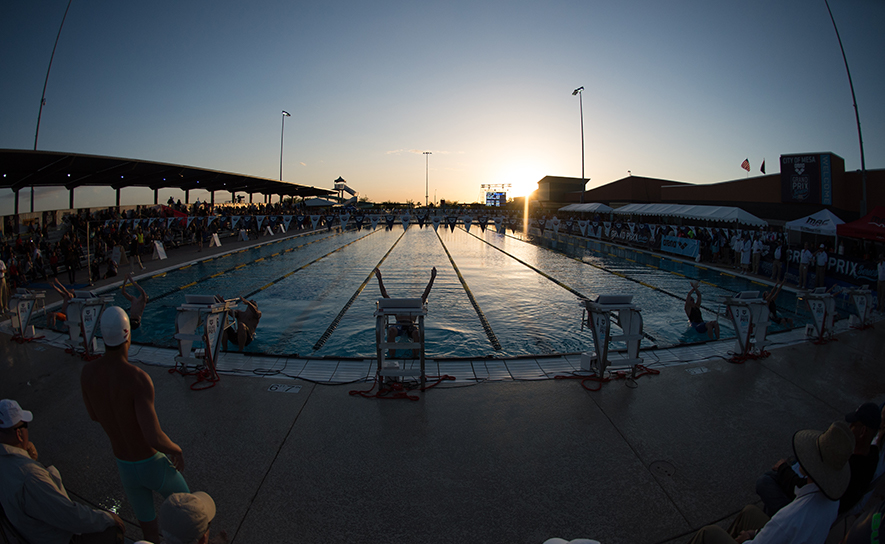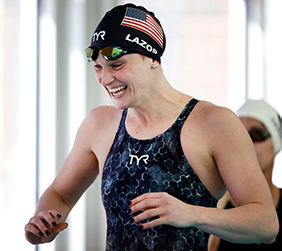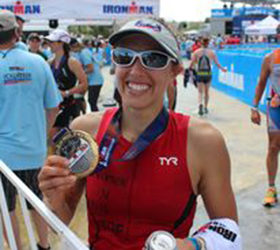USA Swimming News
Thursday, April 1, 2021
My Why: Annie Lazor & Melissa Otterbein

by Chase McFadden//Contributor
Some sage soul, possibly Rowdy Gaines, once mused, “Absence makes the heart grow fonder.”
At this point, our hearts are to the point of bursting with pent-up fondness — and longing — for the pool. Continued and extended periods of quarantine have distanced us from the comfort of chlorine during the 'Rona’s reign, affecting all members of the swim community — athletes, coaches, officials, volunteers, family and supporters alike.
We’ve missed the big moments: postponed U.S. Team Trials and 2020 Olympic Games Tokyo, as well as hundreds of cancelled international, national and local age group meets.
We’ve missed the little moments: obligatory groans at early-morning practice, the communal joy of a dropped tenth, as well as hundreds of laughs, hugs, cheers and tears.
Of course, these aren’t actually the little moments. The relationships, the bonds, the empathy and the love are the true comforts of chlorine.
"My Why" is a series of candid testimonials from individuals who believe in the power of swimming. Their passion for the sport is infectious.
Annie Lazor | U.S. National Team swimmer | Beverly Hills, MI
The reason why I love swimming is simple: I really, really love to race. I love to race because I love the adrenaline I feel when I’m behind the block and know all of my hard work is about to pay off in a matter of minutes. I love touching the wall and looking up and realizing my hard work over the last few months has come to fruition with one really great swim. I love racing people, I love competing and I love the whole atmosphere of a swim meet.
Another reason I really love swimming is because I love the people that I’ve met in this sport. Some of the friends that I’ve made in swimming will be my lifelong friends. The people in swimming are unparalleled. They are kind and nice, striving to achieve the same goals as you. I love being around people like that every day.
Melissa Otterbein | U.S. Masters Swimming coach/USA Triathlon coach and athlete | Colorado Springs, CO
I looked out my window almost every morning as a child to watch my friends walk to the neighborhood pool for swim practice. It looked fun — a team, matching swimsuits, a chance to be outside and make new friends — and I wanted it. I talked to my parents, who felt that I needed more time in swim lessons. Highly motivated, I did as my parents asked, and then at 10 years old, I joined the neighborhood swim team.
I was hooked. I loved everything — the chance to push myself, make new friends, and develop my leadership skills as a high school swim team captain. It became so much more than sport; I realized as an adult that I was practicing the psychosocial skills needed to develop resilience and persistence. “No one can tell if you’re crying behind your goggles,” I wrote in my journal one evening after swim practice. I grew up in a home in which there was addiction. Swimming felt like my safe space to work through difficult emotions while having role models like coaches and older teammates.
I continued swimming in college as a Division 1 swimmer at Towson University. It’s an experience I continue to draw from. What a gift it was to be dedicated to the push, the call, the challenge, unsure if you were about to cry in your goggles or crank out the next set with gritted teeth and a beastly, animalistic confidence you never knew was within you.
The early mornings. The weight room. The obnoxiously-too-bright-for-six-AM pool lights hitting the still water on some early December morning. The rhythm. The soul. The ability to look straight into the clear chlorine-filled waters knowing it didn’t matter what life threw at you that day. You were going to come out on top. And when a setback came, you learned to let it shape you for good and to believe in your potential, to reset and come back again and again.
Swimming offered so many transferable lessons from pool to “real world.” It taught me to have authentic engagement in each moment, in each choice, in each setting you find yourself and commit with vitality, not losing sight of the dreams that tug at your heart. The fortitude to accept that things won’t always be this way, but the complete understanding that we have the power to actively engage in such a way that grows us deeper into who we want to become. You never have to give up the gusto you got from this sport; you just need flexibility enough to adapt to changing life environments.
I am privileged that I am able to engage in the sport I love through triathlon. It has been my form of summer cross training in between collegiate seasons since my first sprint triathlon at 18 years old with my high school swim teammate. I continued racing at the Olympic and 70.3 mile distances, eventually qualifying for the 70.3 World Championships while advocating for women’s inclusion in the Tour de France. I now engage in the sport not only as an athlete but as the Education Manager for USA Triathlon. I also stayed engaged in swimming as a local club coach, former USA Swimming coach, US Masters Swimming coach, collegiate club triathlon coach, and Certified USA Triathlon Level II coach.
I can’t express the joy I feel when I see youth step up to a starting block to push themselves into new experiences. I lose track of time on the pool deck and want to be nowhere else. Pools are havens of growth, possibility, and connection. As coaches, athletes, parents, and fans, I believe this sport pushes us out of our comfort zones — a quintessential skill that allows us to experience the fullness of our humanity.
I’ll see you in the pool.
At this point, our hearts are to the point of bursting with pent-up fondness — and longing — for the pool. Continued and extended periods of quarantine have distanced us from the comfort of chlorine during the 'Rona’s reign, affecting all members of the swim community — athletes, coaches, officials, volunteers, family and supporters alike.
We’ve missed the big moments: postponed U.S. Team Trials and 2020 Olympic Games Tokyo, as well as hundreds of cancelled international, national and local age group meets.
We’ve missed the little moments: obligatory groans at early-morning practice, the communal joy of a dropped tenth, as well as hundreds of laughs, hugs, cheers and tears.
Of course, these aren’t actually the little moments. The relationships, the bonds, the empathy and the love are the true comforts of chlorine.
"My Why" is a series of candid testimonials from individuals who believe in the power of swimming. Their passion for the sport is infectious.
Annie Lazor | U.S. National Team swimmer | Beverly Hills, MI

The reason why I love swimming is simple: I really, really love to race. I love to race because I love the adrenaline I feel when I’m behind the block and know all of my hard work is about to pay off in a matter of minutes. I love touching the wall and looking up and realizing my hard work over the last few months has come to fruition with one really great swim. I love racing people, I love competing and I love the whole atmosphere of a swim meet.
Another reason I really love swimming is because I love the people that I’ve met in this sport. Some of the friends that I’ve made in swimming will be my lifelong friends. The people in swimming are unparalleled. They are kind and nice, striving to achieve the same goals as you. I love being around people like that every day.
Melissa Otterbein | U.S. Masters Swimming coach/USA Triathlon coach and athlete | Colorado Springs, CO

I looked out my window almost every morning as a child to watch my friends walk to the neighborhood pool for swim practice. It looked fun — a team, matching swimsuits, a chance to be outside and make new friends — and I wanted it. I talked to my parents, who felt that I needed more time in swim lessons. Highly motivated, I did as my parents asked, and then at 10 years old, I joined the neighborhood swim team.
I was hooked. I loved everything — the chance to push myself, make new friends, and develop my leadership skills as a high school swim team captain. It became so much more than sport; I realized as an adult that I was practicing the psychosocial skills needed to develop resilience and persistence. “No one can tell if you’re crying behind your goggles,” I wrote in my journal one evening after swim practice. I grew up in a home in which there was addiction. Swimming felt like my safe space to work through difficult emotions while having role models like coaches and older teammates.
I continued swimming in college as a Division 1 swimmer at Towson University. It’s an experience I continue to draw from. What a gift it was to be dedicated to the push, the call, the challenge, unsure if you were about to cry in your goggles or crank out the next set with gritted teeth and a beastly, animalistic confidence you never knew was within you.
The early mornings. The weight room. The obnoxiously-too-bright-for-six-AM pool lights hitting the still water on some early December morning. The rhythm. The soul. The ability to look straight into the clear chlorine-filled waters knowing it didn’t matter what life threw at you that day. You were going to come out on top. And when a setback came, you learned to let it shape you for good and to believe in your potential, to reset and come back again and again.
Swimming offered so many transferable lessons from pool to “real world.” It taught me to have authentic engagement in each moment, in each choice, in each setting you find yourself and commit with vitality, not losing sight of the dreams that tug at your heart. The fortitude to accept that things won’t always be this way, but the complete understanding that we have the power to actively engage in such a way that grows us deeper into who we want to become. You never have to give up the gusto you got from this sport; you just need flexibility enough to adapt to changing life environments.
I am privileged that I am able to engage in the sport I love through triathlon. It has been my form of summer cross training in between collegiate seasons since my first sprint triathlon at 18 years old with my high school swim teammate. I continued racing at the Olympic and 70.3 mile distances, eventually qualifying for the 70.3 World Championships while advocating for women’s inclusion in the Tour de France. I now engage in the sport not only as an athlete but as the Education Manager for USA Triathlon. I also stayed engaged in swimming as a local club coach, former USA Swimming coach, US Masters Swimming coach, collegiate club triathlon coach, and Certified USA Triathlon Level II coach.
I can’t express the joy I feel when I see youth step up to a starting block to push themselves into new experiences. I lose track of time on the pool deck and want to be nowhere else. Pools are havens of growth, possibility, and connection. As coaches, athletes, parents, and fans, I believe this sport pushes us out of our comfort zones — a quintessential skill that allows us to experience the fullness of our humanity.
I’ll see you in the pool.
Related Articles
ARTICLE
USA Swimming Opens Phase Three of Block Party Pilot Program
Aug 14, 2025
ARTICLE
Registration Open for Immersive Coach Development Academy This Fall
Aug 11, 2025
ARTICLE
Participants Named to 2025 Women Coaches in Governance Program
Aug 5, 2025
ARTICLE
Get to Know 2025 World Aquatics Championship Pool Coaches
Jul 28, 2025
ARTICLE
Puskovitch Earns Top-10 Finish on Day Three of the 2025 World Aquatics Open Water Championships
Jul 20, 2025
ARTICLE
USA Swimming Athletes Build Momentum on Day Two of the 2025 World Aquatics Championships Open Water
Jul 19, 2025
ARTICLE
Get to Know 2025 World University Games Coaches
Jul 17, 2025
ARTICLE
Get to Know 2025 Open Water World Aquatics Championships Head Coach Bruce Gemmell and Assistant Coach Maddy Olsen
Jul 14, 2025
ARTICLE
2024-25 Scholastic All-America Program Application Deadline Extended
Jun 24, 2025
